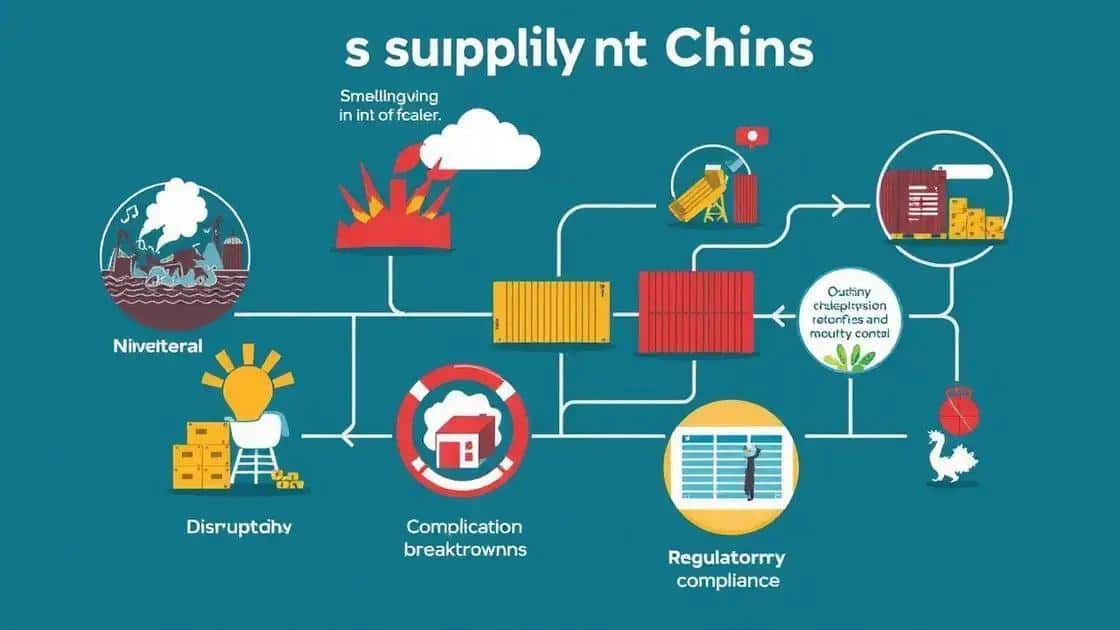Global supply chain resilience efforts: how they shape futures

Anúncios
Global supply chain resilience efforts focus on automation, sustainability, and flexibility to enhance efficiency and adaptability in response to disruptions and changing market demands.
Global supply chain resilience efforts are more crucial than ever in our interconnected world. Have you considered how these efforts impact your business? Let’s explore their significance and explore actionable strategies.
Anúncios
Understanding global supply chains
Understanding global supply chains is essential for any business aiming to succeed in today’s market. These systems connect companies, suppliers, and customers across the world. By grasping how these connections work, organizations can improve efficiency and adaptability.
What is a global supply chain?
A global supply chain involves the flow of goods and services across international borders. It encompasses various stages, including sourcing raw materials, manufacturing products, and delivering them to consumers. This interconnectedness allows businesses to leverage resources and expertise worldwide.
Anúncios
Key components of global supply chains
- Sourcing: Finding the right suppliers who can provide quality materials at competitive prices.
- Production: Manufacturing products efficiently and effectively, often in multiple locations.
- Logistics: Managing the transportation and warehousing of goods to ensure timely delivery.
- Distribution: Getting the final product to the consumer through various channels.
In essence, every link in the chain impacts the overall performance of a business. When one aspect falters, it can cause disruptions throughout the entire system. Hence, fostering strong partnerships and effective communication among all stakeholders is critical.
As we delve deeper into the challenges within these global supply chains, it’s vital to understand how they can affect supply chain resilience. Factors such as economic changes, natural disasters, and political unrest can introduce risks. By identifying these challenges, businesses can create strategies to mitigate them.
Key challenges in supply chain resilience

Key challenges in supply chain resilience can significantly affect how businesses operate. Identifying these challenges is crucial for companies looking to maintain a robust supply chain. Understanding these factors can help in making informed decisions to enhance resilience.
Disruptions and risks
One major challenge is the risk of disruptions. Events like natural disasters, political tensions, and global pandemics can halt operations abruptly. Companies need to have plans in place to address these unexpected situations, ensuring they can quickly adapt to changing circumstances.
Communication breakdowns
Another significant issue arises from communication breakdowns among supply chain partners. When information does not flow smoothly between suppliers, manufacturers, and distributors, it can lead to delays and misunderstandings. Improving communication channels can help avoid these pitfalls.
- Implementing technology: Using advanced software can enhance communication.
- Regular updates: Keeping partners informed reduces uncertainties.
- Collaborative planning: Involving all parties in the planning process fosters trust and transparency.
Additionally, fluctuating market demands pose a challenge. When consumer needs change rapidly, businesses need to be agile and responsive. Companies must continually assess their inventory and production processes to align with market trends and consumer expectations.
Lastly, regulatory compliance can also complicate supply chain operations. Staying updated with local and international regulations requires dedicated resources. Ensuring compliance is essential to avoid legal issues and potential fines, which can disrupt business flow.
Innovative strategies for building resilience
Innovative strategies for building resilience are essential for businesses facing challenges in the global supply chain. These strategies can help organizations adapt and thrive even in uncertain conditions.
Embracing technology
One effective approach is embracing technology. Advanced tools like artificial intelligence and machine learning can analyze data and predict trends. By utilizing these technologies, companies can make informed decisions that enhance their supply chain efficiency.
Developing flexible partnerships
Another strategy is developing flexible partnerships with suppliers. Building strong relationships allows for quick adaptations when changes arise. When companies work closely with their suppliers, they can share resources and information, leading to a more resilient supply chain.
- Shared risk management: Collaboratively managing risks can minimize disruptions.
- Joint innovation efforts: Working together on new ideas can lead to creative solutions.
- Agile responses: Quick decision-making fosters resilience against unexpected changes.
Implementing diversification strategies can also strengthen supply chains. Businesses should avoid relying on a single supplier for critical materials. By diversifying sources, companies can reduce risks associated with supply chain disruptions.
Additionally, investing in employee training is vital. When workers understand the complexities of the supply chain, they can respond effectively to challenges. Training programs that emphasize problem-solving and adaptability prepare employees to handle unexpected situations.
Moreover, conducting regular risk assessments helps identify potential vulnerabilities. Understanding these areas enables businesses to implement preventive measures, ensuring smoother operations even in tough times.
Future trends in global supply chains

Future trends in global supply chains are crucial for organizations looking to remain competitive. As technology evolves, businesses need to adapt to these changes quickly to thrive in a dynamic environment.
Increased automation
One major trend is the increased use of automation. Automated systems streamline processes, reducing the time it takes to complete tasks. Robotics and artificial intelligence are transforming how goods are manufactured and transported. This shift helps companies respond faster to market demands.
Sustainability initiatives
Another significant trend is the focus on sustainability. Companies are increasingly seeking eco-friendly practices in their supply chains. This involves using renewable resources, reducing waste, and ensuring ethical sourcing. By prioritizing sustainability, businesses can improve their brand image and meet consumer expectations.
- Green logistics: Optimizing transportation methods to minimize carbon footprints.
- Supplier sustainability: Choosing partners committed to environmental responsibility.
- Energy-efficient production: Utilizing renewable energy sources in manufacturing processes.
Moreover, digital transformation is reshaping supply chains. Leveraging data analytics allows businesses to gain insights into performance and customer behavior. This data-driven approach enables companies to make informed decisions and enhance operational efficiency.
Resilience will also be a key focus. Global disruptions in recent years have pushed organizations to rethink their supply chain strategies. Future supply chains will likely prioritize flexibility and adaptability to mitigate risk, ensuring continuity even during unexpected challenges.
Lastly, enhanced transparency is becoming essential. Consumers demand to know more about the products they purchase. Companies will need to provide clear information regarding their sourcing and manufacturing processes. This transparency fosters trust and aligns with consumer values.
FAQ – Frequently Asked Questions about Global Supply Chain Resilience
What are the key benefits of automation in supply chains?
Automation increases efficiency, reduces errors, and helps businesses respond quickly to market changes.
How can companies ensure sustainability in their supply chains?
Companies can adopt eco-friendly practices, such as using renewable resources and optimizing logistics to reduce carbon footprints.
Why is flexibility important in global supply chains?
Flexibility allows businesses to adapt to unexpected disruptions, ensuring continuity and minimizing losses.
What role do data insights play in supply chain management?
Data insights help businesses make informed decisions, track performance, and identify trends to enhance overall efficiency.





